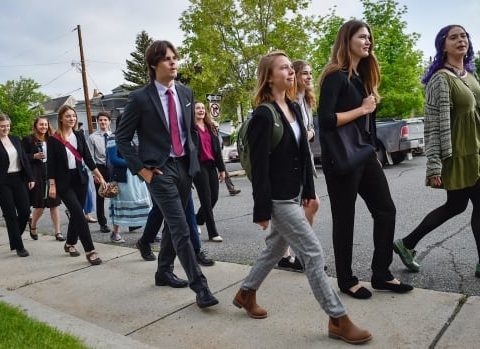Three family members are suing the Alberta government and a company that operates an Edmonton group home, alleging both failed to take steps to prevent the death of 15-year-old Noah Gitsel.
Gitsel died by suicide in May inside a group home in north Edmonton’s Killarney neighbourhood.
In a recently updated statement of claim filed in Edmonton Court of King’s Bench, Gitsel’s parents and sister allege the province and Family Connections Inc. took no precautions to prevent that outcome, even though the teenager had a history of suicidal ideation.
Medical records obtained through freedom of information requests by Gitsel’s mother, Chassie Falardeau, show the teenager had visited several emergency departments that spring.
While at the Stollery Children’s Hospital’s emergency department following a suicide attempt, Gitsel reported ongoing suicidal ideation and a desire for “constant monitoring.”
In April, a psychologist had recommended Gitsel be placed on a psychiatric ward for a comprehensive psychiatric assessment. Falardeau was given a copy of the psychologist’s report.
The family members’ statement of claim says Falardeau communicated concerns about Gitsel’s mental health and risk of suicide numerous times to the defendants, but they failed to heed the warnings.
They are seeking a judgment of $1 million, plus damages, costs and interest.
None of the allegations have been proven in court.
The province denies that proper safeguards were not put in place, and in its statement of defence says the group home operator was in control of Gitsel’s care and custody.
The province says in the document that Falardeau did not express concern about the teenager being at risk of harm while residing at the group home.
Family Connections Inc. has not yet filed a statement of defence and has not responded to a request for comment from CBC News.
A corporate registry search lists Jacqueline Dzioba, a registered social worker, as the company’s director and primary agent for service.
Years of struggle
Falardeau said Noah was an amazing, fearless boy who helped others and was full of energy.
“I though he was really going to make a mark on the world with his personality,” she said.
As he got older, he became aggressive toward his family members and spoke about having suicidal thoughts, Falardeau said. She noticed cut marks on his arms.
“It got to a point where I wasn’t able to care for him myself because he needed professional help,” she said.
The psychologist who had assessed Gitsel in April said in his report that the teenager talked about a history of abuse, depression that began at age 12, habitual cutting and multiple suicide attempts.
The psychologist’s report also said Gitsel was considering a gender transition. In the spring of 2024, the teenager was identifying as female, using she/her pronouns and the name Charlie, and talked about seeking gender-affirming care in the future from the University of Alberta Hospital.
The psychologist said in the report that the 15-year-old had “significant identity diffusion, a lack of coherence of his identity formation and deficits in the development of a coherent sense of self.”
“It is highly probable that if Noah is returned to his home without treatment, then the risk of harm to self and others is considered high,” Dr. Lloyd Flaro wrote.
Falardeau told CBC News she does not believe her son had gender dysphoria. However, she said she would have supported a transition had his mental health issues been addressed.
Missed placement
In 2023, Gitsel had moved to Saskatchewan to live with other family members, Falardeau said.
While there, a placement became available for a live-in program for teenagers at the Royal Alexandra Hospital but Gitsel refused to go back to Edmonton and lost the spot.
Falardeau said she pleaded with Alberta Children and Family Services to help because she wanted Gitsel to get medical attention.
Falardeau and the province mutually agreed, according to the province’s statement of defence, that Alberta would assume custody of the youth for six months.
Gitsel moved into the group home in February, according to the family members’ statement of claim.
Waiting for appointment, live-in program
According to the province’s statement of defence, Gitsel was referred to a mental health clinic as a followup to the recommendations made in the psychologist’s report. A psychiatry appointment was booked for May 27.
The teenager died the day before the appointment.
The province’s statement of defence says Gitsel was also on a waiting list for CASA House, a live-in program in Sherwood Park for teens with significant mental health or addiction challenges.
Preventing youth suicides
Avnish Nanda, the family’s lawyer, said the lawsuit illustrates systemic problems within Alberta and in many other parts of the country.
“This lawsuit is designed to uncover what actually happened to Noah, but also to force the government and group home providers on a systemic level to implement the changes needed to ensure vulnerable youth are protected,” Nanda said.
Alberta’s Child and Youth Advocate has raised concerns about “the continued high number of youth suicides” and the number of young Albertans who die while receiving child intervention services.

Ashli Barrett, press secretary for Children and Family Services Minister Searle Turton, told CBC News in a statement that the government could not speak about this case but continues to strengthen youth suicide prevention initiatives, in keeping with recommendations from the Office of the Child and Youth Advocate.
In March of this year, the province renewed the Youth Suicide Prevention Grant Program for two years, and increased funding by $1 million. The program had originally been launched in 2022 for a two-year term.
The ministry also requires child intervention practitioners to take suicide prevention training, Barrett said.
Children and youth have case plans detailing their mental health needs and supports, and case teams can contact mental health therapists to provide services, she said.
In its statement of defence, the province says Family Connections Inc. operated the group home as an independent contractor and the government had no reason to believe Gitsel was at risk of harm.
In the same document, the province denies failing to act in Gitsel’s best interests.
Seeking answers
Falardeau said she is pursuing the lawsuit so the death becomes part of the public record.
She is also looking for answers to questions surrounding the death.
In her home in the hamlet of Glenevis, northwest of Edmonton, she rarely enters her son’s bedroom because it’s too painful.
A stack of framed photographs sits beside the teenager’s computer.
Falardeau remembers the constant sound of fingers tapping on the keyboard.
“My daughter can’t be here because everything reminds her of him, but I can’t leave here for the same reason,” Falardeau said.
“It takes everything I have to get up every day.”
If you or someone you know is struggling, here’s where to get help:










